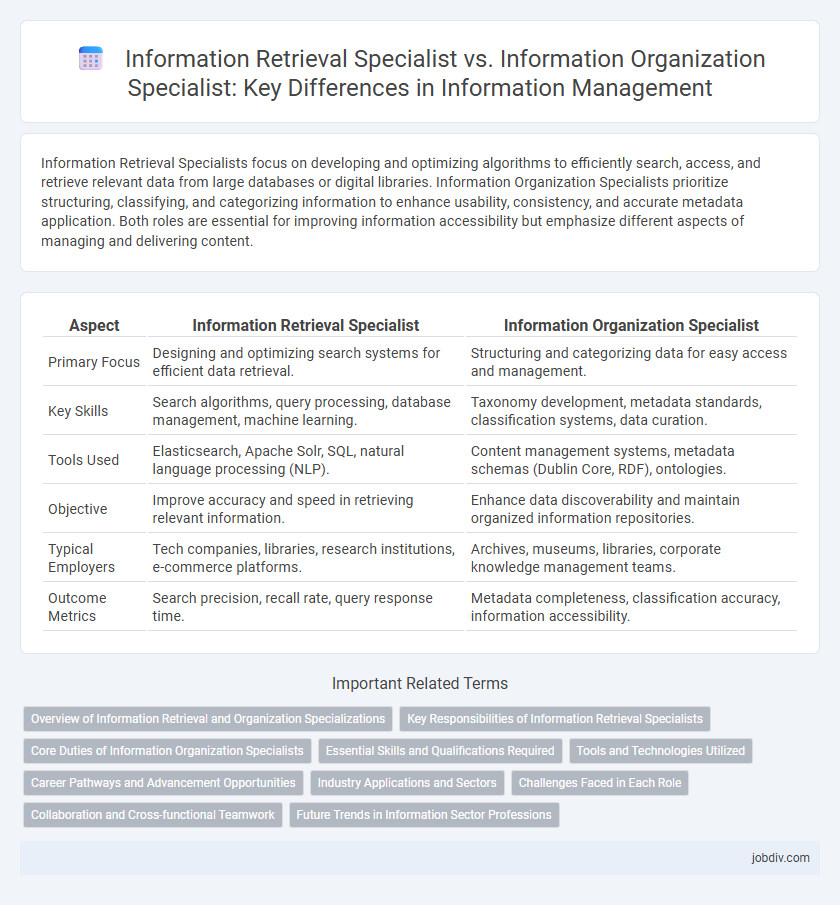Information Retrieval Specialists focus on developing and optimizing algorithms to efficiently search, access, and retrieve relevant data from large databases or digital libraries. Information Organization Specialists prioritize structuring, classifying, and categorizing information to enhance usability, consistency, and accurate metadata application. Both roles are essential for improving information accessibility but emphasize different aspects of managing and delivering content.
Table of Comparison
| Aspect | Information Retrieval Specialist | Information Organization Specialist |
|---|---|---|
| Primary Focus | Designing and optimizing search systems for efficient data retrieval. | Structuring and categorizing data for easy access and management. |
| Key Skills | Search algorithms, query processing, database management, machine learning. | Taxonomy development, metadata standards, classification systems, data curation. |
| Tools Used | Elasticsearch, Apache Solr, SQL, natural language processing (NLP). | Content management systems, metadata schemas (Dublin Core, RDF), ontologies. |
| Objective | Improve accuracy and speed in retrieving relevant information. | Enhance data discoverability and maintain organized information repositories. |
| Typical Employers | Tech companies, libraries, research institutions, e-commerce platforms. | Archives, museums, libraries, corporate knowledge management teams. |
| Outcome Metrics | Search precision, recall rate, query response time. | Metadata completeness, classification accuracy, information accessibility. |
Overview of Information Retrieval and Organization Specializations
Information Retrieval Specialists focus on designing and improving systems that search, locate, and rank information efficiently from vast databases and digital repositories using algorithms and metadata. Information Organization Specialists concentrate on structuring, categorizing, and maintaining information through taxonomy development, metadata standards, and controlled vocabularies to enhance accessibility and usability. Both specializations rely on advancing information architecture and applying knowledge management principles to support effective data discovery and retrieval.
Key Responsibilities of Information Retrieval Specialists
Information Retrieval Specialists focus on designing and implementing systems that optimize search algorithms and indexing techniques to facilitate efficient data retrieval from large repositories. Their key responsibilities include analyzing user queries, improving search relevance through metadata application, and maintaining databases for quick and accurate access. These specialists collaborate closely with software developers and data scientists to enhance information accessibility and usability.
Core Duties of Information Organization Specialists
Information Organization Specialists focus on structuring, categorizing, and maintaining information systems to ensure efficient data retrieval and usability. Core duties include developing taxonomies, metadata standards, and indexing protocols to optimize information accessibility and consistency across digital and physical repositories. These specialists collaborate closely with Information Retrieval Specialists by providing well-organized data frameworks that enhance search accuracy and retrieval performance.
Essential Skills and Qualifications Required
Information Retrieval Specialists require expertise in search algorithms, database management, and natural language processing, enabling efficient data extraction and query optimization. Information Organization Specialists must possess strong skills in metadata standards, classification systems, and taxonomy development to ensure accurate information categorization and seamless accessibility. Both roles demand proficiency in information technology, analytical thinking, and knowledge of relevant software tools to support effective information management.
Tools and Technologies Utilized
Information Retrieval Specialists primarily use search engines, natural language processing (NLP) tools, and machine learning algorithms to enhance data searchability and relevance. Information Organization Specialists focus on metadata standards, taxonomy management software, and content management systems (CMS) to structure and categorize information effectively. Both roles rely on database management systems (DBMS) and data indexing technologies to optimize information accessibility and usability.
Career Pathways and Advancement Opportunities
Information Retrieval Specialists concentrate on developing and refining systems for indexing and searching data, often advancing into roles such as data scientist, machine learning engineer, or chief information officer. Information Organization Specialists focus on structuring and categorizing information to enhance accessibility, progressing toward metadata management, digital curation, or knowledge management leadership positions. Both career paths offer opportunities in academia, corporate research, and government agencies, with advancement depending on expertise in data technologies, project management, and domain-specific knowledge.
Industry Applications and Sectors
Information Retrieval Specialists excel in designing systems that efficiently extract relevant data from large databases, crucial for industries like technology, healthcare, and finance where rapid data access enhances decision-making. Information Organization Specialists focus on structuring and categorizing information, benefiting sectors such as libraries, archives, and corporate knowledge management by improving data accessibility and usability. Both roles are integral to sectors requiring streamlined information processing, yet Retrieval Specialists emphasize search algorithms and indexing, while Organization Specialists prioritize taxonomy development and metadata standards.
Challenges Faced in Each Role
Information Retrieval Specialists face challenges such as handling vast and diverse data sets while ensuring precise search algorithms and relevancy ranking to meet users' retrieval needs effectively. Information Organization Specialists grapple with structuring and categorizing complex information, maintaining metadata accuracy, and developing intuitive taxonomies that support seamless navigation and data interoperability. Both roles require continuous adaptation to evolving technologies, data formats, and user expectations in an increasingly digital and data-driven environment.
Collaboration and Cross-functional Teamwork
Information Retrieval Specialists excel in designing algorithms and systems for efficient data search and access, collaborating closely with software developers, data scientists, and UX designers to enhance search functionalities. Information Organization Specialists focus on structuring, categorizing, and maintaining information repositories, working alongside librarians, content managers, and metadata experts to ensure data accuracy and coherence. Both roles rely on cross-functional teamwork to integrate retrieval technologies with organized information frameworks, improving overall information accessibility and user experience.
Future Trends in Information Sector Professions
Information Retrieval Specialists will increasingly leverage artificial intelligence and machine learning algorithms to enhance search accuracy and personalize user experiences, addressing the growing volume of unstructured data across digital platforms. Information Organization Specialists will focus on developing sophisticated metadata frameworks and implementing semantic web technologies to improve data interoperability and facilitate knowledge discovery in complex information ecosystems. Both roles will demand advanced skills in data analytics, ontologies, and automation tools as organizations prioritize efficient information management to support decision-making and innovation.
Information Retrieval Specialist vs Information Organization Specialist Infographic

 jobdiv.com
jobdiv.com